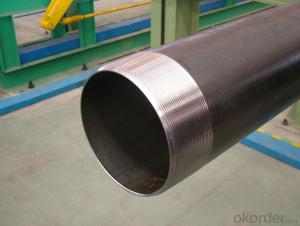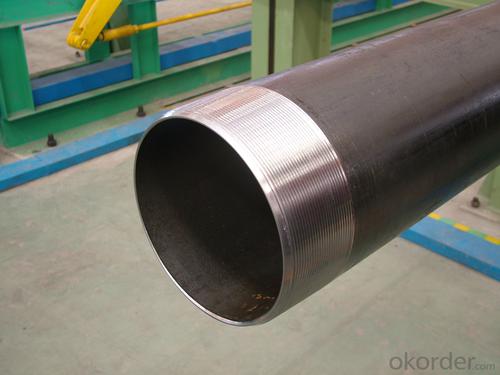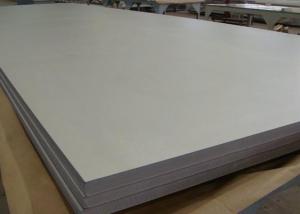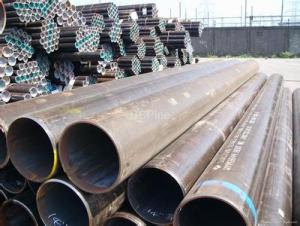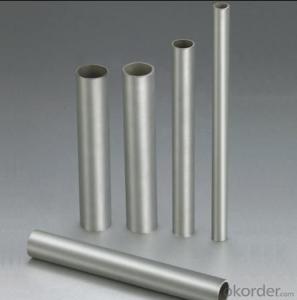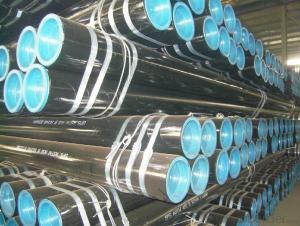Threaded pipes with advanced threading machines
- Loading Port:
- China Main Port
- Payment Terms:
- TT OR LC
- Min Order Qty:
- -
- Supply Capability:
- -
OKorder Service Pledge
Quality Product, Order Online Tracking, Timely Delivery
OKorder Financial Service
Credit Rating, Credit Services, Credit Purchasing
You Might Also Like
| Shape | Round pipe | Square pipe | Rectangular pipe |
| Outer diameter | 17-1820mm | 15*15-170-170mm | 10*20-120*80mm |
| Wall thickness | 0.5-25mm | 0.5-2.3mm | 0.5-2.3mm |
| Length | 4m-14m or as customers' requirements | ||
| Standard | BS1387-85,GB/T3091-08,DIN2440,JIS-G3444,EN10255,ASTM A53 | ||
| Zinc coating | Pre galvanized steel pipe: 60-150g/m2; | ||
| End finish | Plain/ beveled ends or threaded with sockets/coupling and plastic caps. | ||
| Material | Q195 Q215 Q235 Q345 St37 St52 St37-2 10# 20# 16Mn | ||
| Usage | Scaffolding pipe, Structure pipe, Fence/Door pipe, Furniture, Lowpressure fluid pipe for water oil or gas, Boiler pipe. | ||
| Place of origin | China | ||
- Q: What is the difference between carbon steel pipes and stainless steel pipes?
- The main difference between carbon steel pipes and stainless steel pipes lies in their composition. Carbon steel pipes are primarily made of iron and carbon, while stainless steel pipes contain iron, carbon, and a minimum of 10.5% chromium. This chromium content in stainless steel pipes creates a protective layer of chromium oxide on the surface, making them highly resistant to corrosion. On the other hand, carbon steel pipes are more susceptible to corrosion and require additional coatings or treatments to prevent rusting. Additionally, stainless steel pipes offer better heat resistance and can withstand higher temperatures compared to carbon steel pipes.
- Q: How are steel pipes used in the manufacturing of bicycles?
- Steel pipes are commonly used in the manufacturing of bicycles as they provide strength, durability, and flexibility. They are used to create the frame, handlebars, and other structural components of the bike. The steel pipes are cut, shaped, and welded together to form the frame, providing a sturdy and reliable structure for the bicycle.
- Q: Can steel pipes be insulated for thermal efficiency?
- Yes, steel pipes can be insulated for thermal efficiency. Insulating steel pipes helps to reduce heat loss or gain, ensuring better energy efficiency and cost savings. The insulation material, such as foam or mineral wool, is typically wrapped around the pipe to create a barrier that minimizes heat transfer.
- Q: What is the maximum bending radius for steel pipes?
- The maximum bending radius for steel pipes typically depends on the specific grade and diameter of the pipe, but generally, it ranges from three to five times the pipe's outer diameter.
- Q: What are the common standards for coating and lining of steel pipes?
- The most common standards for coating and lining of steel pipes include the American Petroleum Institute (API) standards such as API 5L, API 5CT, and API 5LD. Other widely recognized standards include the American Water Works Association (AWWA) standards such as AWWA C210 and AWWA C213, as well as the National Association of Corrosion Engineers (NACE) standards such as NACE RP0188 and NACE RP0394. These standards ensure the proper selection, application, and performance of coatings and linings to protect steel pipes from corrosion and other external factors.
- Q: The difference between carbon and welded steel tubes
- Seamless steel pipe is made of Steel No. 10-20. It is of high quality carbon structural steelWelded steel pipe is usually welded by Q235 steel plate
- Q: Are steel pipes suitable for transporting gas?
- Yes, steel pipes are suitable for transporting gas. Steel pipes are known for their durability, strength, and resistance to corrosion, making them a reliable choice for transporting various types of gases, including natural gas, oil, and other flammable substances. Additionally, steel pipes can handle high pressure and temperature conditions, ensuring the safe and efficient transportation of gas over long distances.
- Q: How are steel pipes coated to prevent external corrosion?
- Steel pipes are commonly coated to prevent external corrosion through various methods such as galvanization, epoxy coating, or polyethylene wrapping. These coatings act as barriers between the steel surface and the external environment, protecting the pipes from moisture, chemicals, and other corrosive elements.
- Q: How are steel pipes protected against ultraviolet radiation?
- Steel pipes are typically protected against ultraviolet radiation by applying a coating or paint that contains UV-resistant additives. This coating acts as a barrier, preventing the harmful effects of UV radiation from causing damage or degradation to the steel surface.
- Q: How are steel pipes used in the transportation of liquids and gases?
- Due to their durability, strength, and resistance to corrosion, steel pipes find wide applications in the transportation of liquids and gases. Various industries such as oil and gas, water supply, and chemical processing commonly employ them. For the transportation of liquids, steel pipes serve as conduits for crude oil, refined petroleum products, water, and other fluids. These pipes are designed to withstand high pressure and maintain the integrity of the liquid being transported. The smooth inner surface of steel pipes minimizes friction, enabling efficient flow and reduced energy consumption. Moreover, the strength of steel pipes ensures that they can support the weight of the liquid without deformation or failure. In gas transportation, steel pipes are indispensable for the safe conveyance of natural gas, propane, and other compressed gases over long distances. These pipes are engineered to endure high pressures and extreme temperatures. They are also designed to prevent leakage, which is of utmost importance when dealing with flammable or toxic gases. The strength and durability of steel pipes make them ideal for withstanding the stress and strain that may occur during gas transportation. Additionally, steel pipes are frequently utilized in the construction of pipelines for long-distance transportation of liquids and gases. These pipelines can span hundreds or even thousands of kilometers, and steel pipes are the preferred choice due to their high strength and long-term reliability. They can bear the weight of the pipe and the substance being transported, as well as external forces such as soil pressure and temperature fluctuations. In summary, steel pipes play a vital role in the transportation of liquids and gases. Their durability, strength, and resistance to corrosion make them the preferred choice for conveying various substances over long distances. Whether it is for oil and gas, water supply, or chemical processing, steel pipes ensure the safe and efficient transportation of fluids and gases, contributing to the functioning of various industries and economies worldwide.
Send your message to us
Threaded pipes with advanced threading machines
- Loading Port:
- China Main Port
- Payment Terms:
- TT OR LC
- Min Order Qty:
- -
- Supply Capability:
- -
OKorder Service Pledge
Quality Product, Order Online Tracking, Timely Delivery
OKorder Financial Service
Credit Rating, Credit Services, Credit Purchasing
Similar products
Hot products
Hot Searches
Related keywords
